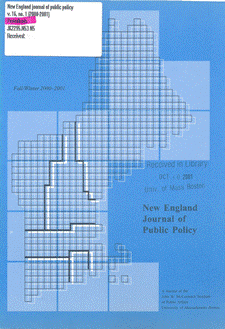Volume 16, Issue 1 (2000)
In this issue of the New England Journal of Public Policy, we present a potpourri of articles disparate in their scope yet with oddly connecting threads. In “Redeeming the City,” Meredith Ramsay undertakes a review of an emerging urban revitalization driven not by traditional grassroots community activists but by religious groups, a phenomenon she describes as faith-based activism. In “Managing Sprawl in the Land of Unintended Consequences,” Robert Bucci concludes that given the American affinity for land, anti-sprawl policies and laws which failto take into account this unique relationship will almost certainly fall short of their goals. Matthew Reidy, in “The Longest Commute,” examines a different kind of sprawl — the geographic sprawl between the communities in which people live and the communities in which they work. “The Harringtons of Salem” is one more essay in which Richard Hogarty chronicles the tumultuous careers of the members of one of Massachusetts’s legendary and illustrious political families. In “The Fountain,” we revive a tradition dating back to the earliest days of the journal.
The last two articles come from different perspectives, except for the fact that both deal with public policy issues germane to the public interest. In his thoroughly researched study of the use of rubella vaccination and its consequences with regard to fetal rights and women’s health, Jacob Heller concludes that vaccines have a cultural value, that the continued expansion of rubella vaccine use includes the structural and professional needs of physicians, that “a cultural, rather than scientific, reliance on the vaccine model of preventive public health administration better explains the consistent support for rubella vaccine despite changes in both the social and medical contexts.” Finally, we are proud to include in the journal an article by Samuel Woode, an associate professor of public administration, School of Administration, at the University of Ghana. His article, “The Handling of Taxpayers’ Money,” provides sharp insights into the problems facing emerging democracies in Africa in confronting fraud, abuse, waste, and corruption in revenue collection, thus reducing the resources available for good governance and hampering sustainable development, without which good governance itself is impossible.
Front Matter
Editor's Note
Editor's Note
Padraig O'Malley
Articles
Managing Sprawl in the Land of Unintended Consequences
Robert S. Bucci
The Harringtons of Salem: A Study of Massachusetts Politics
Richard A. Hogarty
The Fountain
Edie Shillhue
The Handling of Taxpayers' Money: African Examples
Samuel N. Woode
Back Matter

Editors
- Editor
- Padraig O'Malley
- Copy Editor
- Geraldine C. Morse